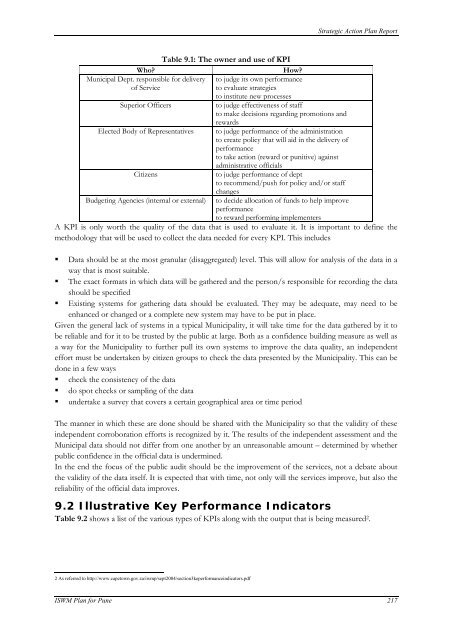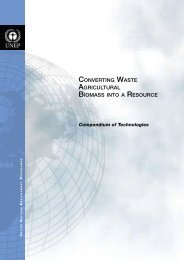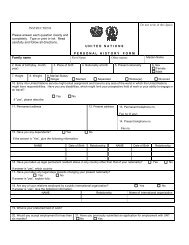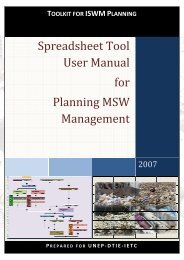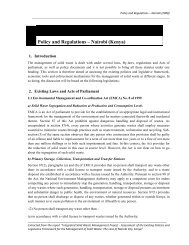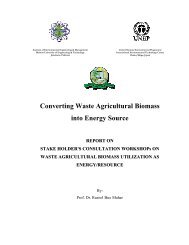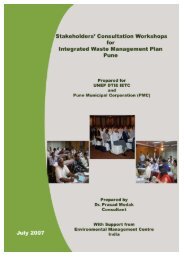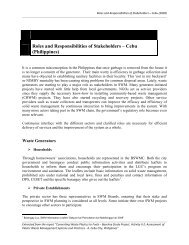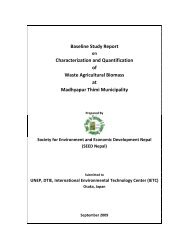Strategic Action Plan - International Environmental Technology Centre
Strategic Action Plan - International Environmental Technology Centre
Strategic Action Plan - International Environmental Technology Centre
You also want an ePaper? Increase the reach of your titles
YUMPU automatically turns print PDFs into web optimized ePapers that Google loves.
<strong>Strategic</strong> <strong>Action</strong> <strong>Plan</strong> Report<br />
Table 9.1: The owner and use of KPI<br />
Who?<br />
How?<br />
Municipal Dept. responsible for delivery to judge its own performance<br />
of Service<br />
to evaluate strategies<br />
to institute new processes<br />
Superior Officers<br />
to judge effectiveness of staff<br />
to make decisions regarding promotions and<br />
rewards<br />
Elected Body of Representatives to judge performance of the administration<br />
to create policy that will aid in the delivery of<br />
performance<br />
to take action (reward or punitive) against<br />
administrative officials<br />
Citizens<br />
to judge performance of dept<br />
to recommend/push for policy and/or staff<br />
Budgeting Agencies (internal or external)<br />
changes<br />
to decide allocation of funds to help improve<br />
performance<br />
to reward performing implementers<br />
A KPI is only worth the quality of the data that is used to evaluate it. It is important to define the<br />
methodology that will be used to collect the data needed for every KPI. This includes<br />
• Data should be at the most granular (disaggregated) level. This will allow for analysis of the data in a<br />
way that is most suitable.<br />
• The exact formats in which data will be gathered and the person/s responsible for recording the data<br />
should be specified<br />
• Existing systems for gathering data should be evaluated. They may be adequate, may need to be<br />
enhanced or changed or a complete new system may have to be put in place.<br />
Given the general lack of systems in a typical Municipality, it will take time for the data gathered by it to<br />
be reliable and for it to be trusted by the public at large. Both as a confidence building measure as well as<br />
a way for the Municipality to further pull its own systems to improve the data quality, an independent<br />
effort must be undertaken by citizen groups to check the data presented by the Municipality. This can be<br />
done in a few ways<br />
• check the consistency of the data<br />
• do spot checks or sampling of the data<br />
• undertake a survey that covers a certain geographical area or time period<br />
The manner in which these are done should be shared with the Municipality so that the validity of these<br />
independent corroboration efforts is recognized by it. The results of the independent assessment and the<br />
Municipal data should not differ from one another by an unreasonable amount – determined by whether<br />
public confidence in the official data is undermined.<br />
In the end the focus of the public audit should be the improvement of the services, not a debate about<br />
the validity of the data itself. It is expected that with time, not only will the services improve, but also the<br />
reliability of the official data improves.<br />
9.2 Illustrative Key Performance Indicators<br />
Table 9.2 shows a list of the various types of KPIs along with the output that is being measured 2 .<br />
2 As referred to http://www.capetown.gov.za/iwmp/sept2004/section3keperformanceindicators.pdf<br />
ISWM <strong>Plan</strong> for Pune 217


